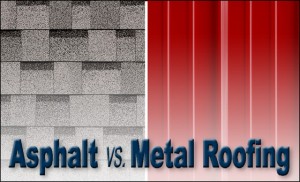Types of Roofing: TYPES OF ROOFING: THE PROS AND CONS OF THE TWO MAJOR ROOFING SYSTEMS
Constructing a new commercial or industrial building usually means choosing between asphalt and steel roofing on wood framing or metal building. Let’s examine the strength and weaknesses of both systems.
Up-front Cost vs. Long-Term Cost
The greatest selling point for traditional asphalt shingles is that they are less expensive than steel roofing. They are also used exclusively on wood-framed structures.
 Many residential production builders admit steel is a superior roofing material. Yet they overwhelming choose asphalt shingles on their residential projects. How a roof stands up to the elements— and how long it lasts— is immaterial to production builders. They focus only on the short-term cost— and its effects on their own bottom line.
Many residential production builders admit steel is a superior roofing material. Yet they overwhelming choose asphalt shingles on their residential projects. How a roof stands up to the elements— and how long it lasts— is immaterial to production builders. They focus only on the short-term cost— and its effects on their own bottom line.
Steel roofing does cost more than asphalt roofing. However, one of the benefits of metal roofing is that it also lasts far longer, offsetting the initial additional cost. The easy maintenance and longevity of steel roofing— especially when combined with a steel-framed structure— attracts the far-sighted businessperson.
Asphalt roofs generally come with a 20 to 40 year warranty, but the length of the warranty has little to do with reality. Read the fine print. The warranty covers DEFECTS in the asphalt product— not LIFESPAN. (In addition, the warranty is useless to anyone buying an existing structure; asphalt roof warranties cover the original buyer only, not subsequent owners.)
On average, composition roofs last about half the length of time stated in the warranty. Neglect or storm damage shortens the lifespan even more.
Another one of the benefits of metal roofing is that it boasts 25 to 50 year warranties. Yet a properly installed and well-maintained steel roof should provide 40 to 60 years of trouble free service!
Weight Comparisons Between These Two Types of Metal Roofing
People expect steel roofing to be heavier than asphalt shingles. They may worry that their structure— especially a wood-framed building— cannot withstand the added weight of switching from asphalt to metal roofing.
Yet another one of the benefits of metal roofing is that it is actually lighter than asphalt shingles.
Steel roofs typically weigh less than 1.5 pounds per square foot; asphalt roofs weigh 2.5 to 5 pounds per square foot.
Soundproofing Abilities of Asphalt and Steel Types of Roofing
Asphalt roofing acts as an excellent sound reducer, baffling outside noise.
Steel roofing on an uninsulated or poorly insulated structure offers less soundproofing than a composition roof. Steel roofs may be especially noisy during a rain or hailstorm.
However, noise is not a factor with well-insulated steel buildings with metal roofs. The deeper walls of a pre-engineered steel building provide a perfect space for thicker, more energy-efficient insulation, dramatically reducing outside noise.
Asphalt and Steel: Which is the Greener of the Two Types of Roofing?
So, which roofing product is the most environmentally friendly?
RECYCLING: The Environmental Protection Agency (EPA) estimates that the U.S. disposes of 11 million tons of asphalt shingles annually. While a small amount of composition roofing is recycled and used as road surfacing, most post-consumer shingles wind up degrading in landfills.
The EPA also voices concerns that the polycyclic aromatic hydrocarbons (PAHs) contained in asphalt— some of which are carcinogenic —put asphalt-recycling workers at risk for cancer.
Steel, as you know, is the most recycled material on earth. All metal roofing is 100% recyclable.
Since all steel roofing contains a high-recycled content, lasts longer, and is easily recycled again at the end of its lifespan, steel roofing easily trumps asphalt shingles as a greenest roofing choice.
ENERGY-EFFICIENCY: With both asphalt and steel roofing, the color of the material affects makes a huge environmental impact.
White and light-colored roofing reflects heat. Black and darker colors absorb heat. Light colored roofs reduce the urban heat island effects in cities; darker roofs contribute to the problem. Lighter roofs are more energy-efficient in hotter climates; darker roofs increase air conditioning bills in summer.
Steel roofing is now also available in reflective cool-coated colors. Cool-coated metal panels save energy and reduce the urban heat island effect in cities.
Pre-engineered Metal Buildings with Steel Roofs
Not only is steel the best choice between these two types of roofing, it is also the best choice for structural framing.
While steel roofing does outperform asphalt roofing, in the long run a roof is only as good as the structure it covers. Why build a new commercial or industrial structure with just a metal roof on a stick building when you can create a better, stronger, more durable building that is entirely steel?
RHINO steel building systems fervently believes no other building system stands up to steel.
Wood framed structures actually move and shift.
As an organic material, the moisture content of lumber changes continually. As the water levels in the lumber change, the wood expands and contracts. Unfortunately, all three dimensions— length, width, and depth— contract and expand at different rates. Consequently, lumber moves. Builders call this process “creep.” Nails pull out. Framing loosens. Doors and windows stick. Floors creak. Rafters sag. Roofs start to leak.
Inorganic steel is impervious to moisture changes.
High-strength bolts, nuts, and screws connect pre-engineered metal buildings. These fasteners do not loosen, pull out, or shift. Steel buildings go up straight— and stay that way for the lifetime of the structure.
Steel buildings and roofs also stand up far better than asphalt roofs and wood-framed structures to Nature’s unpredictable whims.
With the highest strength-to-weight ratio of any building material, steel easily outclasses wood when tested by lightning, fire, gale-force winds, crushing snows, and trembling earthquakes. That is why most insurance companies grant substantial premium discounts to commercial-grade steel buildings.
(NOTE: RHINO steel building systems does NOT sell steel roofing for other structures.)
RHINO ships complete metal building kits for every commercial and industrial application imaginable.
Do you need a new warehouse, hangar, manufacturing plant, restaurant, vehicle showroom, storage facility, garage, or office building? Build it with affordable, long-lasting, easy maintenance, watertight RHINO steel building.
Please call 940.383.9566 today for a quick RHINO quote on your next building project or for information on the types of roofing systems and the benefits of metal roofing.
